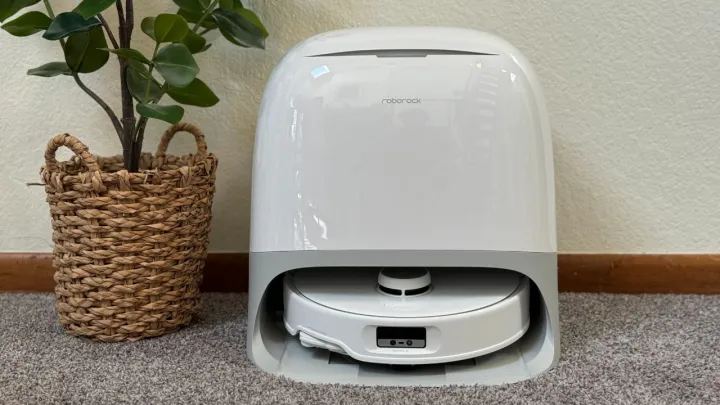Kelly Ortberg, who took over as Boeing CEO in August, is weighing the sale of the company’s space division as part of an attempt to turn things around, according to a report from The Wall Street Journal. The plans, which are reportedly at an early stage, could involve Boeing offloading the Starliner spacecraft and its projects supporting the International Space Station.
Technology
Roborock Qrevo Curv vs. Qrevo Master


The Roborock Qrevo Curv was one of many new devices shown off during IFA 2024. Offering a shocking amount of suction and an updated vacuuming setup, it’s poised to be one of the best robot vacuums of the year. But how does it stack up with the existing Roborock Qrevo Master? More importantly, should owners of the Qrevo Master make the jump to the Qrevo Curv? Here’s a closer look at both robot vacuums to help you decide.
Pricing and design

The Roborock Qrevo Curv is priced at $1,600, making it one of the most expensive robots on the market. It offers a striking dome-shaped docking station and is a stark departure from the rectangular shapes of the competition. Most shoppers should find it to be a well-designed device.
The Roborock Qrevo Master was originally priced at $1,600, but it seems to have been permanently slashed to $950 following the arrival of the Curv. It boasts a traditional rectangular docking station. It looks great — but after seeing the Curv, it definitely seems a bit dated. Still, at under $1,000, it’s a better choice for frugal shoppers.
Winner: Roborock Qrevo Master
Vacuuming

Churning out 18,500Pa of suction, the Qrevo Curv is remarkably powerful. Combined with its new DuoDivide Brush that’s built to avoid tangles and a redesigned FlexiArm swinging side brush, it cleans thick carpets as well as some cordless vacuums. Its brushes can also lift while mopping to ensure they don’t get wet.
The Qrevo Master can also lift its brushes and uses a FlexiArm swinging side brush, but its bristles don’t use the new design — making it a bit more prone to tangles. The same goes for its older DuoRoller Brush on the bottom. The biggest difference, however, is when it comes to suction levels. The Qrevo Master tops out at 10,000Pa.
Both docking stations can hold up to seven weeks of dust, making them incredibly hands-free when it comes to vacuuming operations.
Winner: Roborock Qrevo Curv
Mopping

Mopping specs are largely the same across both robots. They use dual rotating mopping pads that spin at 200 rpm, offer a variety of different water flow levels, and feature a swinging mop to clean near baseboards. Once a cleaning run is completed, it’ll head back to the dock.
Here, its mops will be rinsed with hot water until no dirt is detected. The docking station will then automatically clean its own washboard to ensure all the debris knocked off the mops is washed away into its dirty water reservoir. Mops will then be dried with warm air to ensure nasty odors don’t develop.
Winner: Tie
Additional features

Both robots are packed with additional features. This includes a built-in voice assistant, a powerful mobile app to customize your settings, premium obstacle detection, and the fun ability to capture snapshots of your pets. The Qrevo Curv also features a liftable chassis to climb over thresholds up to 4cm and the ability to heat its water up to 75 degrees Celsius compared to just 60 degrees Celsius on the Master.
Winner: Roborock Qrevo Curv
Verdict
The Roborock Qrevo Curv is undoubtedly the better robot vacuum and mop combo. More suction, better roller brushes, a bold new dock design, and the ability to climb over thresholds make it superior to the older model. Of course, it’s also much more expensive, clocking in at a cool $1,600.
If you need the absolute best robot vacuum, however, it’s an easy recommendation. It offers nearly double the suction of the Master, allowing it to give even the thickest carpets an impeccable clean.
On the other hand, if you already own the Master, don’t feel the need to rush out and buy the Curv. Mopping performance is largely the same across both devices, as are many of the additional features. So unless you need the extra suction for plush carpets, you can probably pass on an upgrade.
Technology
LinkedIn founder Reid Hoffman unveils ‘super agency’ vision at TED AI conference, takes subtle shot at Elon Musk

Join our daily and weekly newsletters for the latest updates and exclusive content on industry-leading AI coverage. Learn More
Reid Hoffman, the LinkedIn co-founder and prominent tech investor, offered an optimistic vision for artificial intelligence on Tuesday, introducing his concept of “super agency” that frames AI as a tool for human empowerment rather than replacement.
Speaking at a TED AI conference fireside chat with CNBC’s Julia Boorstin in San Francisco, Hoffman previewed themes from his upcoming book on super agency, positioning AI as the next frontier of human capability enhancement.
“If you look back at technology, it actually massively increases human agency,” Hoffman said. “Each of these major technological leaps give us superpowers.” He drew parallels between historical innovations like horses and automobiles to today’s AI systems, which he characterized as “cognitive superpowers.”
AI election risks and regulation: Silicon Valley leader pushes back on concerns
The timing of Hoffman’s messaging appears strategic, coming amid growing anxiety about AI’s impact on jobs and democracy. While acknowledging concerns about job displacement and election misinformation, Hoffman maintained that transition challenges are manageable.
On election integrity, Hoffman downplayed immediate risks from AI-generated deepfakes in the 2024 race, though he acknowledged future concerns. “Undoubtedly, there is some use of AI crime and misinformation… but it doesn’t yet have a significant impact,” he said, suggesting technical solutions like “encryption timestamps” could help authenticate content.
Hoffman also defended California Governor Gavin Newsom’s recent veto of sweeping AI regulation, praising instead the White House’s approach of seeking voluntary commitments from tech companies before implementing specific rules. “Having essentially vague, uncertain penalties and uncertain evaluations is a very good way to quell the future development of emerging technology,” he argued.
Enterprise AI opportunities: Where startups can still compete with big tech
For enterprise leaders watching AI developments, Hoffman emphasized that despite the dominance of large tech companies in developing foundation models, opportunities remain for startups building applications on top of them. “There’s a massive amount of AI now,” he said, pointing to areas like sales, marketing, and computer security as fertile ground for innovation.
Notably, Hoffman envisioned AI democratizing access to expertise, describing a future where everyone with a phone could access “the equivalent of a GP everywhere in the world.” This vision aligns with growing enterprise interest in AI assistants and automated customer service solutions.
Silicon Valley’s political divide: Tech leaders split on AI policy and regulation
The discussion revealed tensions in Silicon Valley’s political landscape, with Hoffman addressing what Boorstin characterized as a rightward shift among tech leaders. The conversation took a pointed turn when Hoffman appeared to criticize fellow tech leader Elon Musk’s support of Trump, without naming him directly.
When discussing tech leaders’ rightward shift, Hoffman questioned the motives of “some people who are out there campaigning and spreading pretty wild conspiracy theories… not just on x.com but in other places.”
He suggested such support might be driven by “self-interested” pursuits like “getting government contracts,” rather than genuine policy convictions. The veiled reference to Musk, who has pledged millions to Trump’s campaign and frequently posts pro-Trump content on his X platform, highlights growing divisions among Silicon Valley’s elite over the upcoming election.
Hoffman, a prominent Democratic supporter and backer of Vice President Kamala Harris, attributed some of the broader rightward movement to “single issue voters around cryptocurrency” and business interests seeking favorable regulation. He emphasized that a “stable business environment you can invest in is much more important” than pursuing narrow interests like corporate tax cuts.
Future of work and AI’s next chapter
Hoffman’s vision suggests a fundamental shift in how we should think about AI adoption. While much of Silicon Valley frames artificial intelligence as a replacement for human work, his “super agency” concept positions it as an amplifier of human potential.
“Humans not using AI will be replaced by humans using AI,” Hoffman predicted, arguing that the real divide won’t be between humans and machines, but between those who embrace AI’s capabilities and those who don’t.
The stakes of this transition extend far beyond Silicon Valley. As AI capabilities expand, Hoffman’s optimistic vision will be tested against mounting concerns about job displacement and technological control. But his core message is clear: the future belongs not to those who resist AI, but to those who learn to harness it as a tool for human empowerment—even if that means fundamentally rethinking what it means to be human in an AI-enabled world.
Source link
Technology
A Roundup of Innovation and Wisdom

We’d like to thank SAP for their support. Make sure to catch their Roundtable session: “Visionary Companies Embrace Innovation to Thrive in the Fast-Paced Economy” on Tuesday and Wednesday.
Speakers from The Webby Awards and Silicon Zombies will be on panels at TechCrunch Disrupt 2024 Breakout sessions, and we thank those companies for their support. Check the Disrupt app for more information about Breakout session dates and times.
For more great Disrupt content, check out these partners who will bring their wisdom to our Roundtable sessions:
Take a walk through the Expo Hall and meet Stealth LLM and The Parasol Cooperative — who will also be presenting a breakout session: “Safety, Trust, and Profit: Anticipating Misuse to Build Safer Products and Attract Investment.”
We thank and appreciate Kama Capital (a Fintech Stage sponsor) and VioletX (an AI Stage sponsor).
Geek Ventures, Microsoft Startups, Fintech Americas, Comprehensive.io, and JLL have been very generous in promoting Disrupt to their audiences.
We couldn’t do it without all of our partners, who provide more than just financial support. Their presence at Disrupt gives startups at any stage the tools, knowledge, and community they need to be a success.
See you at Disrupt!
Technology
Boeing reportedly considers selling off its space business

“We’re better off doing less and doing it better than doing more and not doing it well,” Ortberg said during an earnings call this week. “Clearly, our core of commercial airplanes and defense systems are going to stay with the Boeing Company for the long run. But there’s probably some things on the fringe there that we can be more efficient with or that distract us from our main goal here.”
However, sources tell the WSJ that Boeing will likely continue to oversee the Space Launch System, which will eventually help bring NASA astronauts back to the Moon. It’s also reportedly expected to hang onto its commercial and military satellite businesses.
Technology
Look for the AI disclaimer from Google on photos that look a little too good to be true


We’ve all been using photo filters and related tools for years to make our faces, food, and fall decor look their best. AI tools arguably manipulate photos in fundamental ways well beyond better lighting and removing red eyes.
Google Photos has several generative AI features that can alter an image, but Google will now mark on a photo that you’ve used those tools in the name of transparency.
Starting next week, any photo edited with Google’s Magic Editor, Magic Eraser, or Zoom Enhance tools will show a disclaimer indicating that fact within the Google Photos app. The idea is to balance out how easy it is to use AI editing tools in ways that are hard to spot by looking. Google hopes the update will reduce any confusion about image authenticity, whether innocent or done with malicious intent.
Google already marks a photo’s metadata if it’s been edited with generative AI using technical standards created by the International Press Telecommunications Council (IPTC). The metadata is only seen when examining the data behind a photo, relevant only for investigative purposes and record-keeping. But the update digs out that bit of metadata to show along with an image’s more mundane details, such as its file name and location.
AI image mania
Google isn’t singling out its AI tools for the transparency initiative either. Any blended image will have a disclaimer. For instance, the Google Pixel 8 and Pixel 9 smartphones have two photo features: Best Take and Add Me. Best Take will meld together several photos taken together of a group of people into one image to show everyone at their most photogenic, while Add Me can make it look like someone is in a picture who wasn’t there. As these are in the realm of synthetic image creation, Google decided to give them a tag indicating they are built from multiple pictures, though not with AI tools.
You probably won’t notice the change unless you decide to check a picture that seems a little too amazing or if you want to check everything you see out of well-founded caution. However, professionals will probably appreciate Google’s move since they don’t want to undermine their credibility in a dispute over whether they used AI. Trusting a photograph isn’t always enough when AI tools are good enough to trick the eye. A tag or lack thereof by Google might boost trust in a photo.
Google’s move points to what may be the future of photography and digital media as AI tools grow more common. Of course, doing so is also a marketing move. It’s a very minor change to Google Photos in many ways, but proclaiming it helps Google look like it’s being responsible about AI while actually doing so.
You might also like
Technology
Why the feud matters to the internet

 Perthshire Picture Agency
Perthshire Picture AgencyOne of the world’s biggest web publishing platforms – used by a large chunk of the internet – is locked in a spat which is affecting thousands of businesses worldwide.
While most of the work WordPress does is not seen by internet users, it says its behind-the-scenes web-building tools power 40% of the world’s websites.
That means its disagreement with a company called WP Engine is causing disruption to the huge number businesses that rely on the two organisations to keep their websites running.
Tricia Fox, who runs an agency that manages about 70 websites – and is caught up in the row – told the BBC: “I can’t run a business on this level of uncertainty.”
The very wide use of WordPress makes it “crucial to the internet”, according to Daniel Card, fellow of BCS, the Chartered Institute for IT.
But that also means “its actions definitely have a big ripple effect online”, he says – a ripple effect firms like Tricia Fox’s are starting to really feel.
Source of the row
The row between the companies begins with the fact that WordPress has two sides: its non-profit organisation, called WordPress.org, and its profit-making arm, called Automattic.
WordPress.org makes its source code open, which mean anyone can use it to create and redistribute their own tools for free.
That’s what WP Engine does to run a web hosting service.
But in return for the source code, WordPress expects those who use it to contribute to its maintenance, for example by fixing bugs and testing new features.
The boss of WordPress accuses WP Engine of failing to do so, going so far as to call it “a cancer to WordPress.”
As a result, in late September, he banned WP Engine from using key parts of WordPress.
WP Engine rejects these claims.
“We are proud of our extensive contributions to the WordPress ecosystem,” WP Engine wrote in a post on X/Twitter.
Counting the cost
Caught in the middle of this row are the countless websites and blogs that rely on the two companies services.
People like Tricia Fox, who uses a WP Engine subsidiary to host the websites her company serves.
She now says she is “almost certain” to migrate her websites to a different host – a decision which she says is worth “tens of thousands of pounds” over the next few years.
She wants to move away from WP Engine because the fallout has resulted in dozens of hours of extra work for her staff – increasing costs for her business.
“The team don’t know if it’s going to work today or not,” Ms Fox told the BBC.
But she worries even a costly move away from WP Engine may not solve her problems, as she would still be using another host based on the WordPress code.
“What’s to stop WordPress from doing this again [to another company]?” she asks.
“Right now we are currently focused on resolving our dispute with WP Engine,” WordPress said when the BBC asked if it would go after other companies in a similar manner.
Wiring the web
The row also underscores how important the open source principle is to the online economy.
While big tech might attract the headlines, for many people and businesses it is something much less eye-catching that keeps them afloat.
“Open source is all about sharing code and standards so everyone benefits, and it’s a huge part of what makes the internet work,” says Daniel Card.
And with WordPress being such a big player in that world, if it makes changes to its tools, he adds, “it’s felt by users everywhere and often impacts hosting, plugins, and web standards across the internet.”
 WordPress
WordPressHere come the lawyers
While much of the spat between the two sides has taken place through official social media accounts and blog posts, it has also entered the courtroom.
WordPress.org cannot force WP Engine to contribute to its open source project – but it does have control over its trademarks.
It argues that WP Engine mentions WordPress in its marketing tools to help sell its product – and therefore should pay to use the trademark.
“Any business making hundreds of millions of dollars off of an open source project ought to give back, and if they don’t, then they can’t use its trademarks,” Mr Mullenweg wrote in a blog post.
The trademarks do not cover the “WP” abbreviation, but the WordPress Foundation says: “please don’t use it in a way that confuses people”.
WP Engine has meanwhile filed a legal case against Mr Mullenweg and Automattic, with accusations of attempted extortion, libel and a violation of the Computer Fraud and Abuse Act among its complaints.
It claims Automattic told WP Engine they would have to pay “tens of millions of dollars” in order to continue using the WordPress trademarks.
WP Engine has since asked for the legal process to be sped up as its businesses are suffering.
Its recent filing claimed the number of cancellation requests it receives have increased by 14% compared to normal trading, as a result of the disruption.
It said it it is also losing out on potential new customers due to uncertainty over its future access to WordPress products.
Automattic has called the lawsuit “baseless” and “flawed, start to finish.”
“We vehemently deny WP Engine’s allegations – which are gross mischaracterizations of reality,” it said in a statement, adding that it would “vigorously litigate against this absurd filing”.
Technology
ISRO’s new system to detect space junk- The Week

The ISRO has developed a system to track active and dead satellites, said ISRO chairman S Somnath. He added that Safe and Sustainable Operations Management will detect space junk formed due to the collision of objects in space.
Somnath was speaking at the National Space Day celebrations held on Friday in Delhi. The National Space Day fete is held to mark the first year anniversary of the Chandrayaan-3 moon mission.
Detailing ISRO’s policy against littering in space, Somnath said the system also tracks the movement of unwanted satellites and anything that is above 10 cm in size. “We have created a mathematical model for the same. We can model them, we can understand them, we can predict their movement. We already have certain observational capabilities. And are now trying to expand it,” he said. ISRO has vowed to bring satellites back to Earth after the completion of their mission life.
The ISRO chairman reminisced about the Chandrayaan-3 mission and the impact the mission had on the country. He also briefed on the National Space Day celebration held with the participation of departments, ministries, educational institutions, science organisations, NGOs, and the general public.
The event held at Bharath Mandapam Convention Centre in New Delhi also saw President Droupadi Murmu sharing her concern over the space debris as a result of numerous satellites being placed in orbit. “Space debris can cause problems for space missions,” she said while lauding ISRO for setting itself a target to make future space missions debris-free by 2030.
The President also appreciated the ISRO System for Safe and Sustainable Operations Management Facility, which ensures continuous progress of space research activities.
The event was also attended by Minister of State for the Department of Space, Dr Jitendra Singh. The minister said that the government has set a target of $ 44 billion in revenue by 2032. As per the new report released by a European consulting firm, the space sector generated $60 billion in revenue in the last ten years against an investment of $13 billion.
-

 Science & Environment1 month ago
Science & Environment1 month agoHow to unsnarl a tangle of threads, according to physics
-

 Technology4 weeks ago
Technology4 weeks agoIs sharing your smartphone PIN part of a healthy relationship?
-

 Science & Environment1 month ago
Science & Environment1 month agoHyperelastic gel is one of the stretchiest materials known to science
-

 Science & Environment1 month ago
Science & Environment1 month ago‘Running of the bulls’ festival crowds move like charged particles
-

 Science & Environment1 month ago
Science & Environment1 month agoMaxwell’s demon charges quantum batteries inside of a quantum computer
-

 Science & Environment1 month ago
Science & Environment1 month agoX-rays reveal half-billion-year-old insect ancestor
-

 Technology1 month ago
Technology1 month agoWould-be reality TV contestants ‘not looking real’
-

 Science & Environment1 month ago
Science & Environment1 month agoSunlight-trapping device can generate temperatures over 1000°C
-

 Science & Environment1 month ago
Science & Environment1 month agoLiquid crystals could improve quantum communication devices
-

 Technology4 weeks ago
Technology4 weeks agoUkraine is using AI to manage the removal of Russian landmines
-

 TV3 weeks ago
TV3 weeks agoসারাদেশে দিনব্যাপী বৃষ্টির পূর্বাভাস; সমুদ্রবন্দরে ৩ নম্বর সংকেত | Weather Today | Jamuna TV
-

 Science & Environment1 month ago
Science & Environment1 month agoQuantum ‘supersolid’ matter stirred using magnets
-

 Technology3 weeks ago
Technology3 weeks agoSamsung Passkeys will work with Samsung’s smart home devices
-

 News3 weeks ago
News3 weeks agoMassive blasts in Beirut after renewed Israeli air strikes
-

 Football3 weeks ago
Football3 weeks agoRangers & Celtic ready for first SWPL derby showdown
-

 News3 weeks ago
News3 weeks agoNavigating the News Void: Opportunities for Revitalization
-

 Science & Environment1 month ago
Science & Environment1 month agoLaser helps turn an electron into a coil of mass and charge
-

 Science & Environment1 month ago
Science & Environment1 month agoA new kind of experiment at the Large Hadron Collider could unravel quantum reality
-

 Womens Workouts1 month ago
Womens Workouts1 month ago3 Day Full Body Women’s Dumbbell Only Workout
-

 News3 weeks ago
News3 weeks ago▶ Hamas Spent $1B on Tunnels Instead of Investing in a Future for Gaza’s People
-

 Business3 weeks ago
Business3 weeks agoWhen to tip and when not to tip
-

 Sport3 weeks ago
Sport3 weeks agoBoxing: World champion Nick Ball set for Liverpool homecoming against Ronny Rios
-

 MMA3 weeks ago
MMA3 weeks ago‘Uncrowned queen’ Kayla Harrison tastes blood, wants UFC title run
-

 Science & Environment1 month ago
Science & Environment1 month agoPhysicists have worked out how to melt any material
-

 Science & Environment1 month ago
Science & Environment1 month agoWhy this is a golden age for life to thrive across the universe
-

 Science & Environment1 month ago
Science & Environment1 month agoQuantum forces used to automatically assemble tiny device
-

 Technology4 weeks ago
Technology4 weeks agoMicrophone made of atom-thick graphene could be used in smartphones
-

 MMA3 weeks ago
MMA3 weeks agoDana White’s Contender Series 74 recap, analysis, winner grades
-

 Football3 weeks ago
Football3 weeks agoWhy does Prince William support Aston Villa?
-

 MMA3 weeks ago
MMA3 weeks agoPereira vs. Rountree prediction: Champ chases legend status
-

 News3 weeks ago
News3 weeks ago‘Blacks for Trump’ and Pennsylvania progressives play for undecided voters
-

 Sport3 weeks ago
Sport3 weeks agoMan City ask for Premier League season to be DELAYED as Pep Guardiola escalates fixture pile-up row
-
Business3 weeks ago
DoJ accuses Donald Trump of ‘private criminal effort’ to overturn 2020 election
-

 Technology3 weeks ago
Technology3 weeks agoThis AI video generator can melt, crush, blow up, or turn anything into cake
-

 Sport3 weeks ago
Sport3 weeks agoWales fall to second loss of WXV against Italy
-

 News1 month ago
News1 month ago▶️ Hamas in the West Bank: Rising Support and Deadly Attacks You Might Not Know About
-

 Technology1 month ago
Technology1 month agoMeta has a major opportunity to win the AI hardware race
-

 Technology4 weeks ago
Technology4 weeks agoRussia is building ground-based kamikaze robots out of old hoverboards
-

 Science & Environment1 month ago
Science & Environment1 month agoITER: Is the world’s biggest fusion experiment dead after new delay to 2035?
-

 Science & Environment1 month ago
Science & Environment1 month agoA slight curve helps rocks make the biggest splash
-

 Science & Environment1 month ago
Science & Environment1 month agoNerve fibres in the brain could generate quantum entanglement
-

 Science & Environment1 month ago
Science & Environment1 month agoNuclear fusion experiment overcomes two key operating hurdles
-

 MMA3 weeks ago
MMA3 weeks agoJulianna Peña trashes Raquel Pennington’s behavior as champ
-

 Sport3 weeks ago
Sport3 weeks agoAaron Ramsdale: Southampton goalkeeper left Arsenal for more game time
-

 Technology3 weeks ago
Technology3 weeks agoGmail gets redesigned summary cards with more data & features
-

 Technology3 weeks ago
Technology3 weeks agoMusk faces SEC questions over X takeover
-

 Science & Environment1 month ago
Science & Environment1 month agoHow to wrap your mind around the real multiverse
-

 Technology1 month ago
Technology1 month agoWhy Machines Learn: A clever primer makes sense of what makes AI possible
-

 Science & Environment1 month ago
Science & Environment1 month agoTime travel sci-fi novel is a rip-roaringly good thought experiment
-

 Technology3 weeks ago
Technology3 weeks agoMicrosoft just dropped Drasi, and it could change how we handle big data
-

 Sport3 weeks ago
Sport3 weeks agoSturm Graz: How Austrians ended Red Bull’s title dominance
-

 News3 weeks ago
News3 weeks agoFamily plans to honor hurricane victim using logs from fallen tree that killed him
-

 Entertainment3 weeks ago
Entertainment3 weeks agoNew documentary explores actor Christopher Reeve’s life and legacy
-

 Sport3 weeks ago
Sport3 weeks agoChina Open: Carlos Alcaraz recovers to beat Jannik Sinner in dramatic final
-

 Money3 weeks ago
Money3 weeks agoWetherspoons issues update on closures – see the full list of five still at risk and 26 gone for good
-

 Technology3 weeks ago
Technology3 weeks agoThe best budget robot vacuums for 2024
-

 MMA3 weeks ago
MMA3 weeks agoPereira vs. Rountree preview show live stream
-

 MMA3 weeks ago
MMA3 weeks agoKetlen Vieira vs. Kayla Harrison pick, start time, odds: UFC 307
-

 Sport3 weeks ago
Sport3 weeks ago2024 ICC Women’s T20 World Cup: Pakistan beat Sri Lanka
-

 News1 month ago
News1 month ago▶️ Media Bias: How They Spin Attack on Hezbollah and Ignore the Reality
-

 News3 weeks ago
News3 weeks agoWoman who died of cancer ‘was misdiagnosed on phone call with GP’
-
Business3 weeks ago
Sterling slides after Bailey says BoE could be ‘a bit more aggressive’ on rates
-

 Technology3 weeks ago
Technology3 weeks agoTexas is suing TikTok for allegedly violating its new child privacy law
-
Business3 weeks ago
The search for Japan’s ‘lost’ art
-

 Business3 weeks ago
Business3 weeks agoStark difference in UK and Ireland’s budgets
-

 Sport3 weeks ago
Sport3 weeks agoCoco Gauff stages superb comeback to reach China Open final
-

 Sport4 weeks ago
Sport4 weeks agoWorld’s sexiest referee Claudia Romani shows off incredible figure in animal print bikini on South Beach
-

 Technology3 weeks ago
Technology3 weeks agoEpic Games CEO Tim Sweeney renews blast at ‘gatekeeper’ platform owners
-
Business3 weeks ago
Bank of England warns of ‘future stress’ from hedge fund bets against US Treasuries
-

 Science & Environment3 weeks ago
Science & Environment3 weeks agoMarkets watch for dangers of further escalation
-

 Business3 weeks ago
Business3 weeks agoChancellor Rachel Reeves says she needs to raise £20bn. How might she do it?
-

 Technology3 weeks ago
Technology3 weeks agoOpenAI secured more billions, but there’s still capital left for other startups
-
Business3 weeks ago
Head of UK Competition Appeal Tribunal to step down after rebuke for serious misconduct
-

 MMA3 weeks ago
MMA3 weeks ago‘I was fighting on automatic pilot’ at UFC 306
-

 Technology3 weeks ago
Technology3 weeks agoThe best shows on Max (formerly HBO Max) right now
-

 MMA3 weeks ago
MMA3 weeks agoAlex Pereira faces ‘trap game’ vs. Khalil Rountree
-

 Football3 weeks ago
Football3 weeks agoSimo Valakari: New St Johnstone boss says Scotland special in his heart
-

 Technology3 weeks ago
Technology3 weeks agoJ.B. Hunt and UP.Labs launch venture lab to build logistics startups
-

 News3 weeks ago
News3 weeks agoGerman Car Company Declares Bankruptcy – 200 Employees Lose Their Jobs
-

 News3 weeks ago
News3 weeks agoHull KR 10-8 Warrington Wolves – Robins reach first Super League Grand Final
-

 MMA3 weeks ago
MMA3 weeks agoUFC 307 preview show: Will Alex Pereira’s wild ride continue, or does Khalil Rountree shock the world?
-
News1 month ago
the pick of new debut fiction
-

 News1 month ago
News1 month agoOur millionaire neighbour blocks us from using public footpath & screams at us in street.. it’s like living in a WARZONE – WordupNews
-

 News3 weeks ago
News3 weeks agoLiverpool secure win over Bologna on a night that shows this format might work
-
Politics3 weeks ago
Rosie Duffield’s savage departure raises difficult questions for Keir Starmer. He’d be foolish to ignore them | Gaby Hinsliff
-

 Money3 weeks ago
Money3 weeks agoPub selling Britain’s ‘CHEAPEST’ pints for just £2.60 – but you’ll have to follow super-strict rules to get in
-

 News3 weeks ago
News3 weeks agoBalancing India and China Is the Challenge for Sri Lanka’s Dissanayake
-

 News3 weeks ago
News3 weeks agoHeavy strikes shake Beirut as Israel expands Lebanon campaign
-

 TV3 weeks ago
TV3 weeks agoLove Island star sparks feud rumours as one Islander is missing from glam girls’ night
-

 TV3 weeks ago
TV3 weeks agoPhillip Schofield accidentally sets his camp on FIRE after using emergency radio to Channel 5 crew
-

 News3 weeks ago
News3 weeks agoHeartbreaking end to search as body of influencer, 27, found after yacht party shipwreck on ‘Devil’s Throat’ coastline
-

 Technology3 weeks ago
Technology3 weeks agoPopular financial newsletter claims Roblox enables child sexual abuse
-

 Health & fitness3 weeks ago
Health & fitness3 weeks agoNHS surgeon who couldn’t find his scalpel cut patient’s chest open with the penknife he used to slice up his lunch
-

 Technology3 weeks ago
Technology3 weeks agoIf you’ve ever considered smart glasses, this Amazon deal is for you
-

 Technology3 weeks ago
Technology3 weeks agoAmazon’s Ring just doubled the price of its alarm monitoring service for grandfathered customers
-

 Technology3 weeks ago
Technology3 weeks agoApple iPhone 16 Plus vs Samsung Galaxy S24+
-

 TV3 weeks ago
TV3 weeks agoMaayavi (මායාවී) | Episode 23 | 02nd October 2024 | Sirasa TV
-

 Technology3 weeks ago
Technology3 weeks agoHow to disable Google Assistant on your Pixel Watch 3
-

 Travel2 weeks ago
Travel2 weeks agoUK’s ‘happiest islands’ have white sand beaches and attractions older than the Egyptian pyramids
-

 Science & Environment1 month ago
Science & Environment1 month agoPhysicists are grappling with their own reproducibility crisis


You must be logged in to post a comment Login